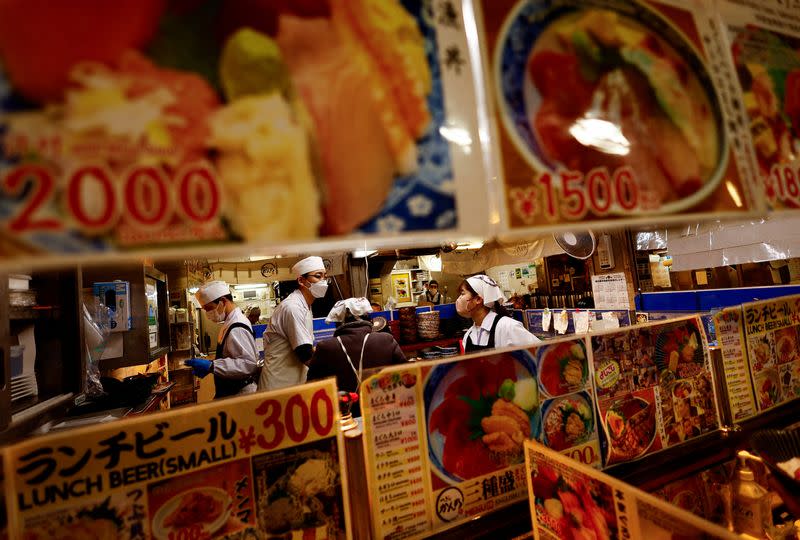China’s services activity expanded at the most sluggish pace in eight months, while confidence in the sector hit a four-year low in June, because of a drop in new orders.
Those findings emerged from a private-sector survey on Wednesday.
The Caixin/S&P Global services purchasing managers’ index (PMI) eased from 54.0 in May to 51.2 – the lowest reading since October 2023 but remaining in expansionary territory for an 18th straight month. The 50-mark separates expansion from contraction.
ALSO SEE: China Lawmakers Finishing Law to Set up Financial Stability Fund
The survey, which covers mostly private and export-oriented companies, aligned with a broader official PMI released on Sunday that showed activity in the services sector sank to a five-month low.
The world’s second-largest economy has reported patchy growth in recent months, reinforcing calls for more policy support to achieve an ambitious growth target of around 5%.
The new orders subindex fell to 52.1 in June from 55.4 the previous month. Overseas demand also eased slightly even on top of strong exports in May.
Employers scale back hiring
Business confidence levels eased to the lowest level since March 2020 with concerns about the global economy and rising competition. Service providers were scaling back hiring again last month after adding employment in May.
But slower rates of inflation for both input and output prices offered a respite to business owners who were grappling with higher input material, labour and transport costs.
The Caixin/S&P’s composite PMI, which tracks both the services and manufacturing sectors, fell to 52.8 from 54.1.
Markets are now focused on a leadership gathering in the middle of July, known as the third plenum, which may see some reforms announced.
Measures that redistribute income from central authorities to local governments, thus reducing their reliance on land sales, will top the agenda of the gathering, according to policy advisers.
“Fiscal and tax reforms should focus on creating more optimistic expectations among market participants,” said Wang Zhe, senior economist at Caixin Insight Group.

Japan’s service activity slips for first time in 2 years
In related news, Japanese service activity also contracted – for the first time in nearly two years – in June as domestic demand cooled, a private sector survey showed on Wednesday. However, business confidence and hiring indicators remained upbeat.
The service sector has been propelling economic growth in Japan, offseting feeble manufacturing performance.
The final au Jibun Bank Service purchasing managers’ index (PMI) slipped to 49.4 in June from 53.8 in May, snapping 21 straight months of expansion, the S&P Global Market Intelligence survey showed.
The PMI was weaker than the flash reading of 49.8, which was the first reading below the 50.0 threshold separating expansion from contraction since August 2022.
‘Pause in growth’
The decline of new business in June marked a pause in growth instead of an outright drop in demand, Trevor Balchin, economics director at S&P Global Market Intelligence, said. “Looking beyond the headline figure, the picture is less concerning,” Balchin said.
Demand in consumer services, finance and insurance, and real estate and business services dropped whereas transport and storage, and information and communication saw increases in June, the survey showed.
The weak yen, which has fallen more than 12% this year, also propped up overseas demand for Japanese services.
Although at a slower pace, employment growth and business confidence in the next 12 months remained relatively robust.
Meanwhile, a combination of wages, food and fuel and the weaker yen drove up input prices, contributing to the fastest inflation since August last year.
Increased wages and material costs prodded companies to continue passing on price hikes to consumers, with the pace of average prices charged easing only slightly from record-highs in April and May.
The composite PMI, which combines the manufacturing and service activity figures, fell to 49.7 in June from 52.6 in May, the first time the index has slipped below the 50.0 in seven months.
- Reuters with additional editing by Jim Pollard
ALSO SEE:
Mixed Reports on China Factory Activity in June, Services PMI Slip
US Lawsuit Says Temu Shopping App Has ‘Hidden Spyware’ – AT
China’s New Rare Earth Rules Seek Product Traceability Details
Red Sea Attacks, US Tariffs on China Imports Choke Asian Ports
Bank of Japan Seen Hinting at Rate Hikes Next Month
China’s Retailers Fear Dismal Sales After 618 Shopping Flop





















